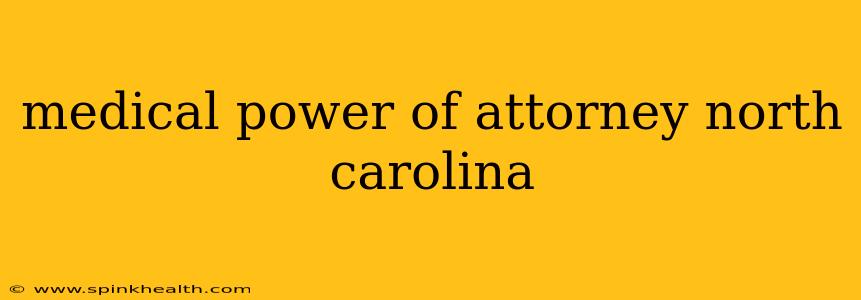The crisp autumn air swirled fallen leaves around my feet as I walked, lost in thought. My grandmother, a vibrant woman who’d always been fiercely independent, was facing a health crisis. The conversation about her medical care, previously a distant abstract, had become a stark reality. It highlighted the crucial need to understand medical power of attorney, especially in North Carolina. This isn't just about legal documents; it's about ensuring your wishes are respected and your loved ones are supported during challenging times.
This journey into the world of North Carolina's medical power of attorney isn't just about legal jargon; it's about peace of mind, ensuring your voice is heard even when you can't speak for yourself.
What is a Medical Power of Attorney in North Carolina?
A North Carolina Medical Power of Attorney (MPOA) is a legal document that lets you choose someone you trust—your agent—to make healthcare decisions for you if you become unable to do so yourself. This inability could be due to a sudden accident, a debilitating illness, or the slow progression of a disease. This chosen individual acts as your voice, ensuring your healthcare aligns with your values and wishes.
Think of it as giving your trusted friend or family member the authority to speak on your behalf when you're unable to. Without an MPOA, your family might face difficult and time-consuming legal processes to make medical decisions, potentially delaying or hindering crucial care.
What are the responsibilities of a healthcare agent in North Carolina?
Your healthcare agent's responsibilities are extensive and significant. They include:
- Making medical decisions: This covers everything from consenting to treatments (like surgery or medication) to refusing treatments.
- Accessing your medical records: Your agent needs access to review your medical history to make informed decisions.
- Communicating with healthcare providers: They act as a liaison between you and your doctors and nurses.
Who Can Be My Healthcare Agent in North Carolina?
Almost anyone you trust can be your healthcare agent. It doesn't have to be a family member; it could be a close friend, a trusted colleague, or even a professional healthcare advocate. The key is choosing someone who understands your values and will faithfully represent your wishes.
Can I have more than one healthcare agent?
Yes! North Carolina allows you to name multiple agents, either to act jointly (both must agree on decisions) or consecutively (one agent takes over if the first is unable or unwilling). This adds a layer of flexibility and security.
How Do I Create a Durable Medical Power of Attorney in North Carolina?
The best way to ensure your document is legally sound is to consult with an attorney. They can help you navigate the complexities of the law and tailor the document to your specific circumstances. You can find attorneys specializing in estate planning through online legal directories or referrals from your primary care physician.
While you can find generic forms online, it's vital to understand that these might not fully meet your individual needs or fully comply with North Carolina law. A lawyer can help you avoid potential legal complications down the line.
What if I don’t have a Medical Power of Attorney?
If you don't have an MPOA, your family will likely have to petition the court for guardianship or conservatorship to make healthcare decisions on your behalf. This is a much more complex, time-consuming, and costly process. It's far easier—and less stressful for your family—to have a properly executed MPOA in place beforehand.
What Happens if My Agent Becomes Unable to Act?
Your MPOA should specify what happens if your agent becomes incapacitated or unwilling to serve. You can name a successor agent who will step in if the primary agent is unable to fulfill their duties. This ensures a seamless transition and avoids any gaps in decision-making.
What are the key things to consider before choosing a healthcare agent?
Choosing your healthcare agent is a significant decision. Consider these factors:
- Trust and Reliability: Choose someone you completely trust to act in your best interests.
- Understanding of your wishes: Ensure they understand your values and preferences regarding medical care.
- Willingness to serve: Make sure they're willing and able to take on this responsibility.
- Ability to make difficult decisions: Healthcare decisions can be complex and emotionally challenging.
Preparing an MPOA isn't just about ticking off a legal box; it's about securing your future and ensuring your healthcare aligns with your deeply held beliefs. It’s a testament to thoughtful planning and a gift to your family, shielding them from unnecessary burdens during a difficult time. Take the time to understand this critical aspect of estate planning; your peace of mind—and your family’s—depends on it.

